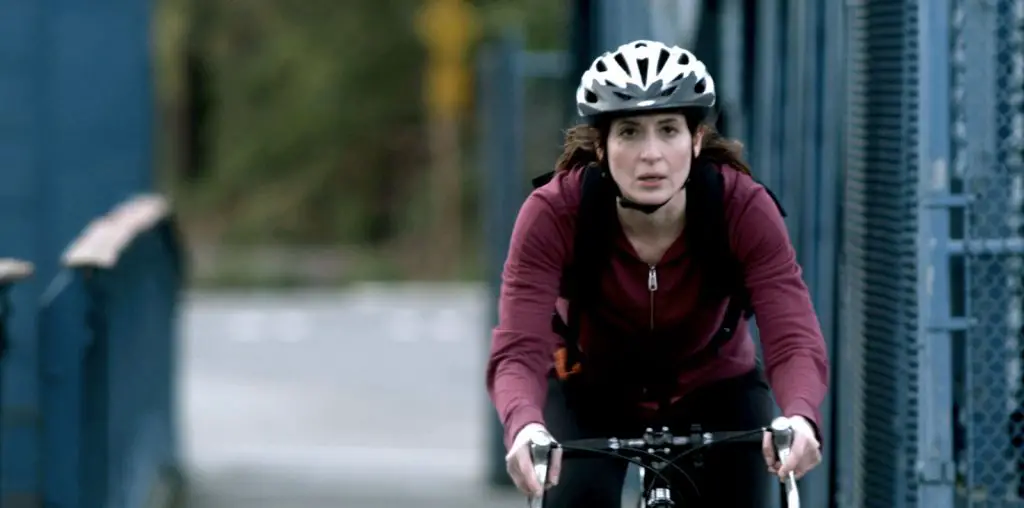
The Loews Santa Monica Beach Hotel was a miracle of skylighted lobbies, peppy graphic designs and skirted trade booths. And about a thousand conference-goers in ID tags, all filled with varying degrees of artistic instincts and mercenary yearnings.
I’m surrounded by the downtrodden of Hollywood. Y’know, screenwriters. And here we all were, hopping. From panel to panel. Because there were too many cool things going on, and you never knew where the next pearl of wisdom was going to come from.
The pleasant dilemma was this: panels ran in simultaneous groups of three, almost like networks competing for audiences. Did you want to see Robert Towne speak, or would you rather hear about the predicament of the TV movie,
or were you burning to find out “How to Pitch In the Big Leagues”? Where did
you want to look for your pearls of wisdom: in the advice of film agents,or
in the “big break” stories of writers like Billy Bob Thornton, or in the group discussion of the assembled writing staff of “Frasier”? One conference-goer said the conference was like Disneyland: too many rides.
But I did my best to hop from panel to panel during the three days I was there, between fancy sit-down lunches and cocktail parties at night, one of
which featured a hilarious live skit performance by Jack Lemmon and Walter
Matthau. (I know, how did they get all these people? The conference was
worthwhile just as an experience in Brushes with Fame. Just to name a few,
Carrie Fisher, Rob Reiner, Saul Zæntz, Nora Ephron, and Tracy Ullman were
all on panels, as were a whole bunch of people that I realized were extremely
important even though I’d never seen pictures of them before.) And here are some of the pearls I found.
[ OLIVER STONE’S EXPOSES HIS MIDDLE ] ^ I was really captivated by Oliver Stone’s story of how he volunteered to fight in Vietnam after his 1300-page manuscript for his first novel was rejected by publishers. Then, he went on to describe that while in Vietnam he survived by relying on his senses, and how beautiful the yellows and greens of the monsoon were, and how he started to take pictures of everything because written notes would only dissolve in the rain. His photography became his transition into film as an external medium for the internal experience. He also offered practical advice, “If you’re shooting low-budget, shoot the middle of the movie first. That way if you run out of money you can go back to your financiers and say, ÔI just need to shoot the beginning and the end.'”
[ ROBERT TOWNE LIGHTS UP ] ^ Then there was Robert Towne talking about the DP’s complaints on Bonnie & Clyde: “He kept swearing he was going to get thrown out of the cinematographer’s union because of the way we made him shoot the movie. We had this one scene where they were in a field, and we only used the headlights of the car, and the actors’ heads were in shadow.
And Bernie said “That’s it, I’m quitting. You can’t see their f–in’ faces!’ Dissolve to: the Oscars. The film is nominated for all kinds of awards, and who wins? Bernie.”
[ CAMERON CROWE WILL SAY ANYTHING ] ^ The Cameron Crowe panel (actually titled “Romance, Love and Sex on Screen”) was my favorite, though. Cameron Crowe “Jerry Maguire” and his fellow panelists (including Nora Ephron “When Harry Met Sally”, Zalman King “9 1/2 Weeks” Maria Maggenti “The Incredibly True Adventures of Two Girls in Love” and Ted Witcher “Love Jones”) debated and joked and confessed over topics ranging from studio notes (Ted Witcher: “The development people kept telling me ‘More Say Anything’ and ‘More Harry Met Sally’ and I tried to make it those two things, and then it looked like it was gonna turn into Billy Dee Williams and Diana Ross, even though I had started out with this intellectualized conceit about overcoming fears of intimacy; and I kept getting these notes, and rewriting, and finally I said “F-k it, it’s Billy Dee and Diana Ross.'”) to showing nudity (“Directors are lying when they tell you nudity is necessary,” Nora Ephron said. “It is never, never, NEVER necessary.” A beat, and Nora realized that Zalman King was sitting next to her with a somewhat wounded look.).
Best of all was when Cameron Crowe discussed how to externalize “falling in love” into specific moments on a script page. Referring to the scene in “Say Anything” where John Cusack and Ione Skye are walking in a parking lot and Cusack kicks some broken glass out of the way for her: “It’s the kind of thing that you remember years later, even after you’ve broken up with
the person, even if the relationship didn’t work out: ÔY’know, he kicked the glass for me. I should give him a call.'”
Unfortunately, that panel never got back to moderator Merrill Markoe’s first question, which was how movies have shaped our expectations of what it is to fall in love, and why it’s always these stunningly beautiful people who “meet cute” and run the other way from each other and then get the knock on the door on New Year’s Eve. I for one wanted to get some kind of vindication for feeling that my life is incomplete because I’m not in the middle of a tortured love affair with a soulmate from whom I at first recoiled.
And I know I’m not alone in this feeling, by the way. While waiting for the panel called “Case Study: The X-Files,” I shared bitterness with a nice woman named Melanie about the pressure to meet cute like they do in the movies, and how that never happens in real life; and then Nina, a stunningly beautiful woman, leaned around and said, “Actually, I have to admit that my husband and I kind of met cute. I was in the elevator of my dorm at college, and this tall blond athlete walked in…” and Melanie and I fell silent to stare at the diamond-studded ring (“Oh, thanks! He picked it out himself.”) on Nina’s cheerily waving hand.
[ CHRIS CARTER OUTS THE TRUTH ] ^ Mercifully, Chris Carter arrived at that point, and our attention turned to paranoia, skepticism and alien life forms. Chris Carter himself was shrewd, funny, and incredibly down to earth. Learn your craft, he told us. Always be honing your skills and listening to your instincts. And when I asked him (I actually had to get up to the mike to do this, I want you to know) “As advice to people just starting their careers, what are the best and worst actions you’ve ever taken?” he said that the worst thing he’d ever done was to take on a TV show(this was in years past) that he was not emotionally connected to. He didn’t elaborate, but it was clear that it hadn’t been a very positive experience. “I was really just doing it for the sake of doing it, and it wasn’t meaningful to me,” he said.
Conversely, I gathered, the right thing to do is to pursue what really matters to you. And success comes out of this, according to the panelists. Roger Avary didn’t get independent financing for Killing Zoe until he started telling people, “I’m making this movie with or without your money.”
Callie Khouri wrote Thelma and Louise purely because it was the movie she wanted to see, not because she ever expected anyone else to take an interest
in it. And the film agents (who also said “No,” we usually don’t read those cold query letters you send us, because we really prefer to read only those scripts that are handed to us by people we know and respect) encouraged everyone to “write the scripts that you feel the most strongly about. It’ll result in better quality scripts, and even if those aren’t the ones you sell, those will be the writing samples that get you other work.”
“It’s like dating,” one panelist said (I hopped in late to that session and so I don’t know her name). “The more you run after it, the more it escapes you. It’s when you don’t chase that it comes to you.”
My big brush with fame occurred when I was schmoozing in the lobby after the panel and the person I was talking to said, “He looks so young.” I turned around, and Cameron Crowe was standing right behind me. “Excuse me,” I said, and went to wait with the other fans. When it was my turn, I said breathlessly, “I just have to tell you that I’ve always really loved that `kicking the glass’ scene.” We chatted for a few moments, about that scene and about the panel he’d been on; he seemed genuinely startled to have been put up on a stage in front of a room full of people, “as if we know what we’re talking about.” He was so nice that it was impossible to blame him for the state of my love life.
Anyway, what I got out of the conference comes down to the one piece of advice I heard in some form from every panelist, kind of like Zen meets Chris Carter meets Cameron Crowe: Follow your heart, with persistence. Others will respond.

